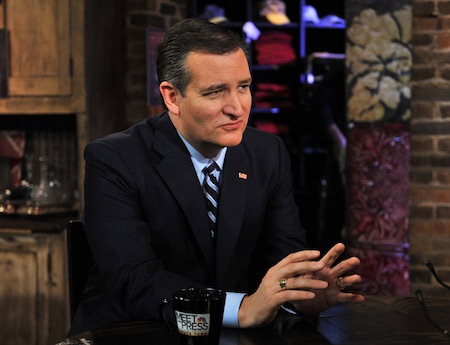Ted Cruz Takes Aim at Municipal Broadband, Cuba

The smarter way to stay on top of broadcasting and cable industry. Sign up below
You are now subscribed
Your newsletter sign-up was successful
GOP presidential candidate and Texas senator Ted Cruz wants Congress to block the FCC from preempting state laws related to government provision of Internet access services or loosening communications restrictions on Cuba.
That is according to a copy of a raft of proposed amendments to a couple of FCC-related bills being marked up in the Senate Commerce Committee April 27.
On the FCC Process Reform Act, Cruz and Sen. Deb Fischer (R-Neb.) are jointly proposing the amendment to rein the FCC's preemption of state laws limiting municipal broadband buildouts. FCC chairman Tom Wheeler says those laws are pushed by incumbents to prevent price and service competition and the FCC has stepped in to preempt state laws in Tennessee and North Carolina. The FCC is currently in a court battle over that decision.
The amendment, according to the list obtained by B&C, "prohibits the FCC form preventing states from implementing laws relating to provision of broadband Internet access service by state and local governments."
Cruz is also looking to bulk up the FCC Reauthorization Act of 2016 (S. 2644) with a couple of amendments targeted at Administration efforts to ease restrictions on Cuba (Cruz's father, Rafael, was tortured and imprisoned in Cuba [during the Batista regime], according to the candidate).
The first would overturn the FCC's order removing Cuba from the "exclusion list."
In January, the FCC removed Cuba from that very short list—Cuba was actually the only country on the list—as part of the larger Administration effort to reestablish diplomatic ties to the island nation.
The smarter way to stay on top of broadcasting and cable industry. Sign up below
The FCC action meant that U.S. telecoms can provide Internet and phone service to Cuba without seeking a separate approval from the FCC. Those telecoms will be able to get authority more easily, says the FCC, or those already with authority to deploy won't need an additional sign-on from the commission.
Cruz also wants to block the FCC from launching a Cuba-related rulemaking about "certain nondiscrimination requirements relating to Cuba.
Those are just some of many amendments being teed up for the two bills. Others include: 1) a GAO study on the IP transition; 2) a review of "certain media ownership rules;" 3) a report on the incentive auction repack; 4) a small business exemption (fewer than 250,0000 subs) from the enhanced transparency rule in the Open Internet order (a similar waiver has already passed the House); 5) a GAO report on waste and overbuilding in the E-rate program; 6) a requirement that the FCC include a disclaimer when making a public statement about a notice of apparent liability; 7) a requirement that it publish complaints on a publicly available website; 8) a requirement that the GAO report on "issues" related to the National Broadband Map; 9) permitting NTIA to authorize federal agencies to "accept certain payments related to spectrum efficiency and reallocation," an FCC report on "the use of certain proceeds from a competitive bidding process; 10) a requirement that the FCC report on any auctions it expects to conduct in succeeding 12-month periods; 11) a requirement that a member of the FCC sign any "compulsory" process or request for documents, information or testimony "in support of an investigation or inquiry;" and 12) a report on "delays in processing broadband license applications."
Contributing editor John Eggerton has been an editor and/or writer on media regulation, legislation and policy for over four decades, including covering the FCC, FTC, Congress, the major media trade associations, and the federal courts. In addition to Multichannel News and Broadcasting + Cable, his work has appeared in Radio World, TV Technology, TV Fax, This Week in Consumer Electronics, Variety and the Encyclopedia Britannica.

